Life in Addis Ababa and parts of Ethiopia after the advent of COVID-19
Kaleab Ketema
16 April 2020
It has been only a few months since the World Health Organization declared that COVID-19 is a global pandemic. The WHO has announced that the consequences of COVID-19 will be profound in Africa. The pandemic has reached each corner of the continent, and Ethiopia—like the other countries in Africa – has already started feeling its impacts. Ethiopian Airlines has suspended international flights to over 30 destinations, tourists are not coming to the country, hotels and restaurants have lost their customers, and some companies have had to reduce the number of their employees.
Ethiopia is one of the poorest countries in the world, where a significant proportion of the population is unable to meet basic needs. Although the country has made considerable improvements in poverty reduction since 2000, poverty is still very high in the country. The country faces high levels of food insecurity and many people in rural areas and towns don't have access to perennial supply of water. This may complicate both the trajectory of the virus throughout the country and the efforts made to thwart it.
Back in January and February, before the infection was first reported in Africa, most radio and television programs in Ethiopia were focused on reporting other issues in the world like politics and sports, and there were many people who thought that the illness wouldn't come to Ethiopia. Nevertheless, many politicians and activists were asking Ethiopian Airlines to stop flying to China.
Then the entire news program shifted to cover the number of people who became infected or died of the illness in European countries. Earlier in March, we heard an announcement that a 48-year-old Japanese national went to a quarantine center five days after he entered Addis Ababa from Burkina Faso because he showed the symptoms of the infection. A few days later, the Ethiopian Public Health Institute (EPHI) confirmed that the Japanese national was COVID-19 positive and told the people that the 25 people who had contact with him were under quarantine. In light of this, the Prime Minister, the Health Minister and other higher officials advised people to keep their distance from other people, wash their hands frequently, and avoid gatherings and handshaking. They also entreated religious institutions to advise their followers to pray in their houses rather than congregate in churches. All of these measures are difficult to implement in Ethiopia because of the strong collectivist culture.
At this point, some people started buying in bulk the things that they thought they would need in their households if things got worse. Price gouging was widespread and in response, the government took strict measures on businesspeople who unfairly raised prices of goods and closed their shops. Similarly, pharmacies that raised the prices of alcohol, sanitizer gloves, and face masks were closed by the government. Some young men and children made fun of people who wore masks and gloves in the streets.
When the first COVID-19 related death in Ethiopia was reported earlier in April, the number of people in the streets who wore masks and gloves increased and people started practicing physical distancing at taxi stations, shops, banks, and supermarkets. However, many people still did not stop shaking hands or gathering in cafes, restaurants, and bars at that time. The second death was reported the next day. After this, the number of people wearing gloves and face masks increased further and the busier streets in Addis became deserted. Supermarkets and flour mills became packed with people who wanted to reserve food, cooking oils cleaning materials, alcohol and sanitizers. People flocked to pharmacies to by facemasks which were in low supply. At about this time, some volunteers in places like Mexico square, The National Stadium, and Megenagna put water containers with pipes and started telling people to wash their hands frequently. Shops, pharmacies, banks, and other people started telling people to wash their hands and use hand sanitizer before they were allowed to enter.
 People waiting outside a pharmacy to buy sanitisers. (Photo credit: Elias Meseret)
People waiting outside a pharmacy to buy sanitisers. (Photo credit: Elias Meseret)
On March 16, the government closed schools and universities for 15 days and told students and parents to be in their houses and follow further notice on the issue. Following the increase in the number of people infected by the virus, the government announced its decision that everyone that enters the country will be quarantined for 15 days and extended the closure of schools for another two weeks. The government also made an announcement warning people that they could declare a national state of emergency if things get worse. In the meantime, they told people to keep a distance from one another and avoid gatherings and going to mosques and churches for worship. Many people refused to listen to this guidance.
In Ethiopia, people have lost their trust in the information they get from the media because most of the main media outlets have been used by previous governments as propaganda machines. And it is a custom for Ethiopians to go to their places of worship in times like this. We pray to God to save us from anything that could threaten our peace and stability. Some of us even believe that it is God who assigns our leaders, autocratic or not, to us. So we normally go to our places of worship and pray to God to change or correct our governments because we believe that it is God who assigns governments or send illnesses to us. Understanding this entrenched aspect of our culture, the current government convinced the authorities in mosques and churches to discourage mass attendance and prayer programs started being televised.
Another complicating factor is that a significant number of people believe that the illness is sent by God or in conspiracy theories about its origin. Some portion of the people believe that the illness was sent to us because of our sins. They claim that we should pray God to turn from His wrath. Others say that the virus was engineered by some secret society to depopulate the world. Historical mistrust of the media and the government gives weight to these types of ideas.
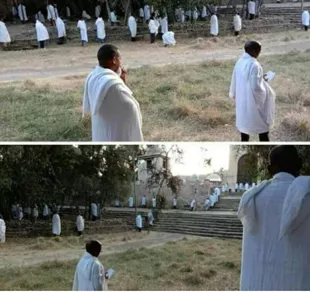 Worshippers practicing social distancing at St Mary’s Church in Axum (Photo credit: COVID-19 updates: ET)
Worshippers practicing social distancing at St Mary’s Church in Axum (Photo credit: COVID-19 updates: ET)
Although these measures and warnings were meant to keep people in their houses and avoid public gatherings, within days, the streets and market places started becoming full of people again. Those who were told to take a mandatory day off or work in shifts used their time outside their offices to meet friends and relatives. As previously mentioned, Ethiopia is a country with strong collectivist cultures; it is therefore very difficult for people to understand and implement physical distancing. Ironically, a common sight around Addis was people making lines with gaps of two meters between them only to then get into taxis that carry numbers of people far beyond their carrying capacities.
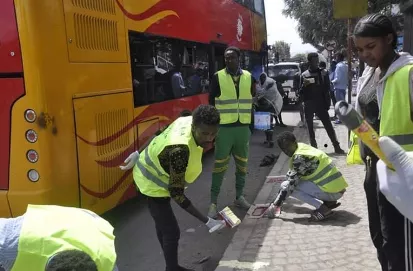 Volunteers marking roads for physical distancing (Photo credit: Bole Sub-city Woreda 9 Communication Affairs Office)
Volunteers marking roads for physical distancing (Photo credit: Bole Sub-city Woreda 9 Communication Affairs Office)
Despite the campaigns made by ministers and influential people, markets like Merkato, the biggest open-air market in Africa, are still packed with many people. The government moved the vegetable market to a place called Jan Meda because people refused to keep their physical distance from one another. Some people even attacked those who have told them to avoid gathering. Yesterday, four people attacked and killed a restaurant owner in Worabe, Silte zone, just because he told them that they shouldn't gather and chew khat.
As I am writing this, 85 people have tested positive for the virus in Ethiopia. The government of Ethiopia has just declared a state of emergency to fight coronavirus (COVID-19) pandemic and put restrictions on public transportation into and out of Addis Ababa which is the epicenter of the virus in the country. The city's mayor has said that Addis Ababa will not be put under lockdown. Instead, he said the city would focus on other ways to contain the spread of coronavirus. As for me, I think that putting Addis Ababa in full lockdown would be very difficult because most of the people in Addis Ababa can't afford to stay inside their houses, as many of them do menial jobs as daily laborers and they are very poor. The city administration called for the city’s rich people to help the mayor’s office in its endeavor to help poor people and established food banks for people who could face food shortages if the worst-case scenarios happen and lockdown becomes imminent. However, the number of people who need food help might overwhelm the city administration's capacity. There are many street dwellers in the city and some of them are seriously mentally ill people. Another problem is the shortage of adequate and consistent, clean running water which may make it more difficult for people to wash their hands frequently.
Yesterday, the federal police announced that it will take measures against people who don't follow the rules set by the government for the state of emergency without any preconditions. If there is perceived police overreaction, however, this could aggravate political unrest in the country and lead to riots or other demonstrations.
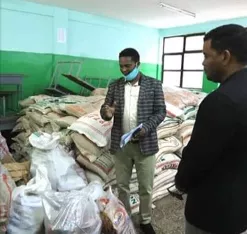 Addis Ababa city’s deputy mayor in one of the food banks established by the city administration. [Photo credit: Addis Ababa city Administration]
Addis Ababa city’s deputy mayor in one of the food banks established by the city administration. [Photo credit: Addis Ababa city Administration]
Much has been said in the international press about the worrisome lack of ICU units in most sub-Saharan African countries to help patients if the worst-case scenario is to pass. There aren't enough protective clothes for physicians to treat patients. In Ethiopia, there are less than 300 mechanical ventilators in the country and some biomedical engineers and physicians are working hard to fix those whose warranty has expired.
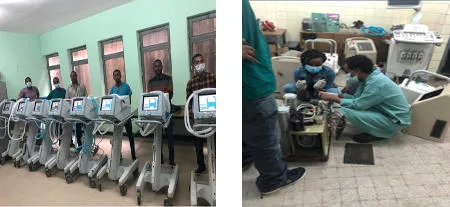 About twenty biomedical engineers and some physicians working to fix mechanical ventilators and other medical instruments needed in ICU units. [Photo credit: Elias Meseret]
About twenty biomedical engineers and some physicians working to fix mechanical ventilators and other medical instruments needed in ICU units. [Photo credit: Elias Meseret]
Easter for the Ethiopian Orthodox Church is coming tomorrow and is a massive national holiday marked by eating meat dishes to celebrate the end of a long fasting season. Many people were worried that they might not be able to eat raw meat like usual, however the meat markets for chickens, goats, sheep, and oxen have been open.
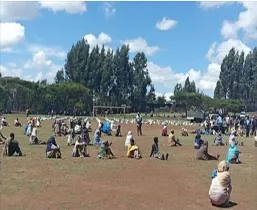 Poor people waiting to receive help from community members in Fiche. [Photo credit: Shewatatek Hailu]
Poor people waiting to receive help from community members in Fiche. [Photo credit: Shewatatek Hailu]
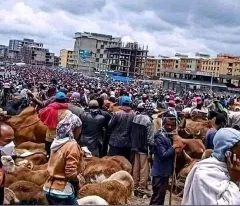 Livestock Market in Addis Ababa (Photo credit: Dawit Nigussu)
Livestock Market in Addis Ababa (Photo credit: Dawit Nigussu)
Throughout the city, we can see instances like this, where culture and public health measures and advice come into conflict. It is safe to say, however, that the entire population of Ethiopia is and will continue to be praying for the country to be spared the worst of the virus outbreak.
The most important thing to mention amidst all of this however, is that Ethiopians did not stop caring for one another, irrespective of their religious, ethnic, political and other differences. This is what we need at this unprecedented time and is an example for the region and the world.
Views and opinions expressed in this article are entirely my own.
Kaleab Ketema lives in Addis Ababa. He graduated in Applied Genetics from Addis Ababa university (2007). He did his research in EPHI, with the support of Ethio-Netherlands Aids Research Project (ENARP). He was an instructor in Menschen für Menschen (ATTC college in Harar, Ethiopia). He works as an independent consultant for research projects. He is interested in medical anthropology, molecular biology and social psychology.